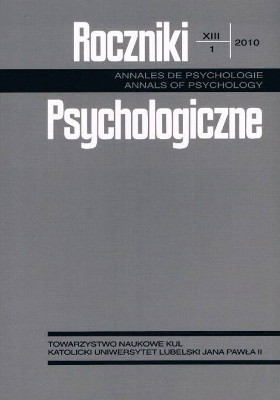Prezentacja metody pomiaru złożoności integratywnej
Abstrakt
Artykuł ma na celu prezentację metody pomiaru złożoności integratywnej. Termin „złożoność integratywna” można zdefiniować jako miarę stylu intelektualnego, używanego przez jednostki przy przetwarzaniu informacji, rozwiązywaniu problemów i podejmowaniu decyzji. W artykule opisano teoretyczne podstawy miary złożoności integratywnej i zaprezentowano przegląd badań, w których metoda ta została wykorzystana. Szczegółowo omówiono wyznaczniki, na których powinni opierać się sędziowie kompetentni przy pomiarze i kodowaniu złożoności integratywnej. Przedstawiono również ocenę prezentowanej metody pomiaru oraz porównano ją z innymi miarami złożoności poznawczej.
Bibliografia
Baker-Brown, G., Ballard, E. J., Bluck, S., de Vries, B., Suedfeld, P., Tetlock, P. E. (1992). The integrative complexity coding manual. W: C. Smith (red.), Handbook of thematic analysis (s. 605-611). Cambridge: Cambridge University Press.
Conway, L. G., Suedfeld, P., Tetlock, P. E. (2001). Integrative complexity and political decisions that lead to war or peace. W: D. J. Christie, R. V. Wagner, D. Winter (red.), Peace, conflict, and violence: Peace psychology for the 21st century (s. 66-75). Englewood Cliffs: Prentice-Hall.
Feist, G. J. (1994). Personality and working style predictors of integrative complexity: A study of scientists’ thinking about research and teaching. Journal of Personality and Social Psychology, 67, 474-484.
Golec, A. (2001). Strukturalne aspekty myślenia politycznego. Prezentacja koncepcji i metody badawczej Shawna Rosenberga na przykładzie danych z badań polskich polityków. Czasopismo Psychologiczne, 7, 43-60.
Golec, A. (2002). Poziomy rozwoju myślenia politycznego a postawy wobec konfliktu w sytuacji neutralnej i wobec emocjonalnego ataku. Studia Psychologiczne, 40, 43-65.
Graber, D. (1976). Verbal behavior as politics. Urbana: University of Illinois Press.
Gurba, E. (2002). Wczesna dorosłość. W: Harwas-Napierała, J. Trempała (red.), Psychologia rozwoju człowieka (t. 2, s. 202-233). Warszawa: Wydawnictwo Naukowe PWN.
Gruenfeld, D. H. (1995). Status, ideology, and integrative complexity on the U.S. Supreme Court: Rethinking the politics of political decision making. Journal of Personality and Social Psychology, 68, 5-20.
Hunsberger, B., Pratt, M., Pancer, S. M. (1994). Religious fundamentalism and integrative complexity of thought: A relationship for existential content only? Journal for the Scientific Study of Religion, 33, 335-346.
Jakubowska, U. (2005). Ekstremizm polityczny. Studium psychologiczne. Gdańsk: GWP.
Jhangiani, R., Suedfeld, P. (2005). The structure of terror: Cognitive and emotional processing of 9/11 newscasters. Referat zaprezentowany na konferencji International Society of Political Psychology, Toronto.
Korzeniowski, K. (1991). Poczucie podmiotowości - alienacji politycznej. Uwarunkowania psychospołeczne. Poznań: Nakom.
Kossowska, M. (2005). Umysł niezmienny. Poznawcze mechanizmy sztywności. Kraków: WUJ.
Liht, J., Suedfeld, P., Krawczyk, A. (2005). Integrative complexity in face-to-face negotiations between the Chiapas guerrillas and the Mexican government. Political Psychology, 26, 543-552.
Myyry, L. (2002). Everyday value conflicts and integrative complexity of thought. Scandinavian Journal of Psychology, 43, 385-395.
Perry, W. B. (1968). Forms of intellectual and ethical development in college years: A scheme. New York: Holt.
Piaget, J. (1966). Narodziny inteligencji dziecka. Warszawa: PWN.
Piaget, J. (1972). The moral judgment of the child. Londyn: Routledge & Kegan Paul Ltd.
Reykowski, J. (1999). Myślenie polityczne. W: K. Skarżyńska (red.), Psychologia polityczna (s. 99-125). Poznań: Zysk i S-ka.
Riegel, K. F. (1973). Toward dialectical theory of development: The final period of cognitive development. Human Development, 16, 346-370.
Rosenberg, S. W. (1988). Reason, ideology and politics. Princeton: Princeton University Press.
Schroder, H. M., Driver, M. J., Streufert, S. (1967). Human information processing. New York: Holt, Rinehart & Winston.
Scott, W. (1962). Cognitive complexity and cognitive flexibility. Sociometry, 25, 405-414.
Sidanius, J. (1984). Political interest, political information search, and ideological homogeneity as a function of sociopolitical ideology: A tale of three theories. Human Relations, 37, 811-828.
Skarżyńska, K. (1994). Język polityki: Wielość perspektyw i nieostrość znaczeń. W: K. Handke, H. Dalewska-Greń (red.), Polszczyzna a/i Polacy u schyłku XX wieku (s. 248-260). Warszawa: SOW.
Skarżyńska, K. (2005). Człowiek a polityka. Zarys psychologii politycznej. Warszawa: Scholar.
Suedfeld, P., Bluck, S. (1988). Changes in integrative complexity prior to surprise attacks. Journal of Conflict Resolution, 32, 626-635.
Suedfeld, P., Bluck, S., Ballard, E. J. (1994). The effects of emotional involvement and psychological distance on integrative complexity. Journal of Applied Social Psychology, 24, 443-452.
Suedfeld, P., Rank, A. D. (1976). Revolutionary leaders: Long-term success as a function of changes in conceptual complexity. Journal of Personality and Social Psychology, 34, 169-178.
Suedfeld, P., Tetlock, P. E. (1977). Integrative complexity of communications in international crises. Journal of Conflict Resolution, 21, 169-184.
Suedfeld, P., Tetlock, P. E., Streufert, S. (1992). Conceptual/integrative complexity. W: C. P. Smith (red.), Motivation and personality: Handbook of thematic content analysis (s. 393-400). New York: Cambridge University Press.
Tadmor, C. T., Tetlock, P. E. (2006). Biculturalism: A model of the effects of second-culture exposure on acculturation and integrative complexity. Journal of Cross-Cultural Psychology, 37, 173-190.
Tetlock, P. E. (1981). Pre- to post-election shifts in presidential rhetoric: Impression management or cognitive adjustment? Journal of Personality and Social Psychology, 41, 201-212.
Tetlock, P. E. (1983). Cognitive style and political ideology. Journal of Personality and Social Psychology, 45, 118-126.
Tetlock, P. E. (1985). Integrative complexity of American and Soviet foreign policy rhetoric: A time- series analysis. Journal of Personality and Social Psychology, 49, 1565-1585.
Tetlock, P. E., Peterson, R. S., Berry, J. M. (1993). Flattering and unflattering personality portraits of integratively simple and complex managers. Journal of Personality and Social Psychology, 64, 500-511.
Tetlock, P. E., Tyler, A. (1996). Churchill’s cognitive and rhetorical style: The debates over Nazi intentions and self-government for India. Political Psychology, 17, 149-170.
Thoemmes, F. J., Conway, L. G. (2007). Integrative complexity of 41 U.S. presidents. Political Psychology, 28, 193-226.
Trempała, J. (2002). Rozwój poznawczy. W: Harwas-Napierała, J. Trempała (red.), Psychologia rozwoju człowieka (t. 3, s. 13-44). Warszawa: Wydawnictwo Naukowe PWN.
Tyszkowa, M. (1985). Post- i neopiagetowskie koncepcje rozwoju poznawczego: przesłanki, tezy i inspiracje. Psychologia Wychowawcza, 2, 121-131.
Van Hiel, A., Mervielde, I. (2003). The measurement of cognitive complexity and its relationship with political extremism. Political Psychology, 24, 781-801.
Copyright (c) 2010 Roczniki Psychologiczne

Utwór dostępny jest na licencji Creative Commons Uznanie autorstwa – Użycie niekomercyjne – Bez utworów zależnych 4.0 Międzynarodowe.


